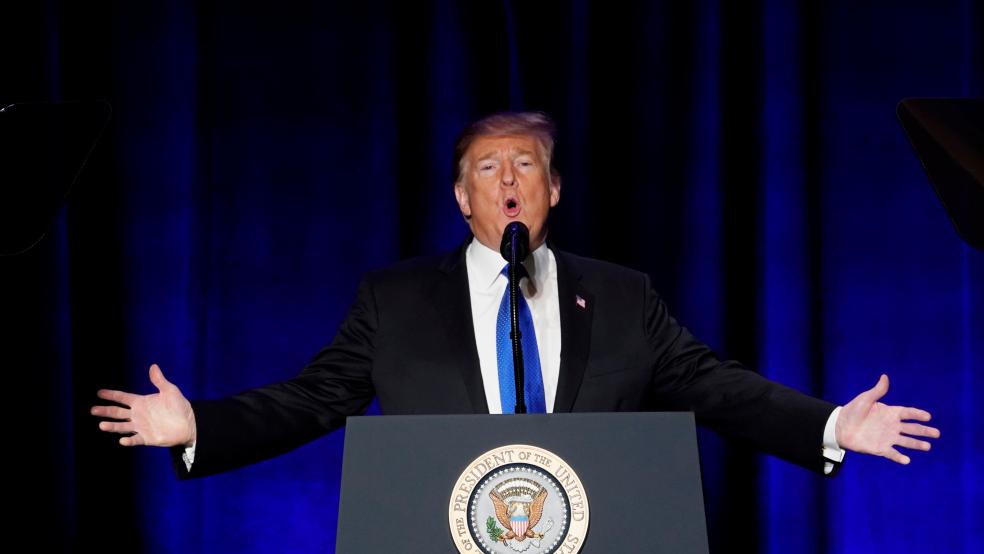President Trump this week boldly proclaimed that “the Republican Party will soon be known as the party of health care.” The president reportedly told lawmakers that he had come up with the new branding on his way from the White House to the Capitol.
Turning that slogan into reality before the 2020 election will be close to impossible. Developments this week show why—and highlight how the administration, for now at least, is sowing disarray across broad swaths of the health care system.
Eliminate Obamacare – Then What?
Republican lawmakers were left scrambling when the Trump administration this week threw its support behind a legal ruling to invalidate the entire Obama health law. "If the Supreme Court rules that Obamacare is out, we will have a plan that's far better than Obamacare," Trump told reporters Wednesday. On Thursday, he said that he has asked a small group of Republican senators, including John Barrasso of Wyoming, Bill Cassidy of Louisiana and Rick Scott of Florida to craft a plan. “They are going to work together, come up with something that’s really spectacular,” Trump told reporters.
But while the White House was looking to Congress for a plan, some Republicans were looking to the White House. “I look forward to seeing what the president is proposing and what he can work out with the speaker,” Senate Majority Leader Mitch McConnell told Politico on Thursday, adding, “I am focusing on stopping the ‘Democrats’ Medicare for none’ scheme.” Other GOP lawmakers are unlikely to pull together behind a new proposal without knowing that Trump supports it, a situation that has stalled progress in the past.
Republicans, as they did in 2017, could develop a plan that relies on block grants to the states. But, as the Associated Press notes, “when the nonpartisan Congressional Budget Office analyzed similar proposals a couple of years ago, it estimated such changes would result in deep coverage losses, not to mention weaker insurance protections for people with pre-existing medical conditions.” Republicans, the AP adds, were divided in 2017 about how to develop a fair formula for providing federal money to each state.
The party is in a similar bind over protections for patients with pre-existing medical conditions. While Trump and other Republicans have promised to maintain those protections, their legislative attempts to do so have fallen short of preserving current safeguards or could allow insurers to raise costs for patients based on their health status.
Marc Short, a top aide to Vice President Mike Pence, said Wednesday that Trump will submit a plan to Congress “this year.” Whoever is drafting the new effort, the GOP’s 2017 efforts to repeal and replace Obamacare showed it won’t be easy to come up with a proposal that can find consensus among Republicans, let alone one that can garner 60 votes in the Senate and pass the Democratic-led House — or gain widespread support among the American public. “The problem for GOP lawmakers is the paucity of free-market policy ideas for health care that are politically popular,” Bloomberg’s Sahil Kapur writes.
Courts Strike a Blow to Trump’s Health Agenda
In the meantime, a federal judge on Thursday struck down the Trump administration’s rule letting small businesses and sole proprietorships join together to buy so-called “association health plans,” writing that those plans were “clearly an end-run” around the Affordable Care Act’s benefit requirements means to protect consumers. That decision followed rulings this week by another federal judge invalidating the Trump administration’s approval of work requirements for Medicaid recipients in Arkansas and Kentucky, saying that the government must consider the effects of the requirements on low-income people who stand to lose coverage.
Those rulings may not deter the administration from continuing to pursue its policies, but they sure won’t help Trump’s nascent rebranding campaign. Neither will headlines about thousands of people losing their health coverage, or the administration’s efforts to undermine the Affordable Care Act, which has risen in popularity since before Trump was elected.
A New Path?
Washington Post columnist Henry Olsen suggests that, to truly be seen as the party of health care, Republicans will have to try a new approach: prioritizing patient care above controlling costs.
“Over time, growing health costs and an aging population are projected to drive up government expenditures dramatically. Paying for those added costs would require significant tax hikes, bringing U.S. tax levels much closer to those found in Canada or Britain. Preventing that rise is surely a good thing, but Americans have yet to be persuaded to care more about this than they do about the security of Medicare. … [D]esigning a plan so that the risk of failure falls on the federal budget rather than the patient is the right way to go.”
There is, however, no sign that Republicans are currently interested in making such a fundamental shift, and it’s likely that Olsen’s advice will fall on deaf ears, leaving Republicans right back where they started on health care.
The bottom line: President Trump has made a promise Republicans will have a hard time keeping. He’s done so before — does anyone remember his sudden pledge just before the 2018 midterms to pass a 10 percent tax cut for the middle class? But in contrast to that earlier promise, Trump seems less likely to let go of this health care pledge, which means it could cause real trouble for him and the rest of the GOP heading into 2020.





